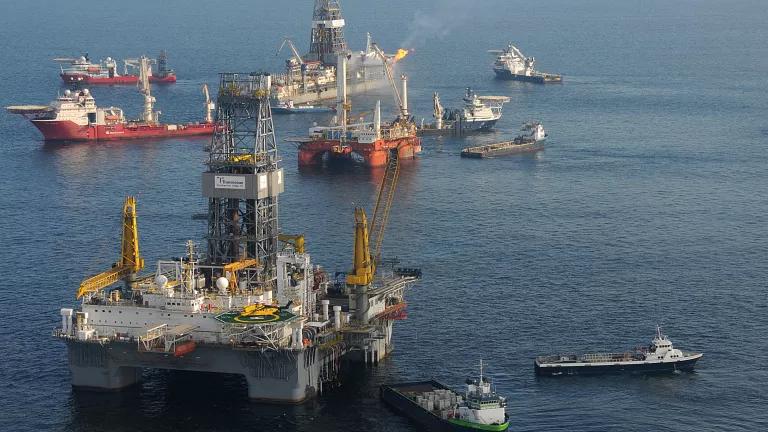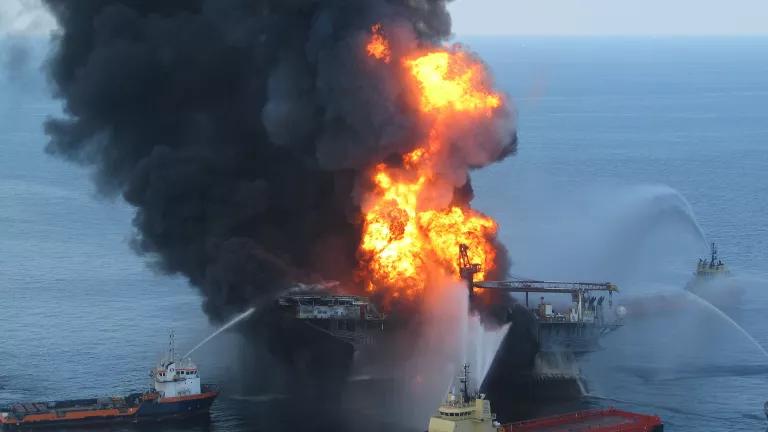DOI Seeks Basic Reform, Not Overhaul, of Oil and Gas Program
The Department of the Interior has released its much-anticipated report on how it plans to reform federal oil and gas leasing and permitting.

Spill response and waste gas burning during Deepwater Horizon disaster.
The Department of the Interior (DOI) has released its much-anticipated report on how it plans to reform federal oil and gas leasing and permitting. The agency held a public forum to gather input for the report in March with representatives from Tribal governments, frontline communities, industry, academia, and various NGOs.
For years, communities and Congress have called for major reforms to the broken and outdated oil and gas leasing system that is harming public lands and oceans, destroying critical habitat, and exacerbating the climate crisis. The report captures these shortcomings, noting that the federal oil and gas program:
“fails to provide a fair return to taxpayers, even before factoring in the resulting climate-related costs that must be borne by taxpayers; inadequately accounts for environmental harms to lands, waters, and other resources; fosters speculation by oil and gas companies to the detriment of competition and American consumers; extends leasing into low potential lands that may have competing higher value uses; and leaves communities out of important conversations about how they want their public lands and waters managed.”
DOI Charts a Course for Reform
Government watchdogs have flagged significant concerns with the onshore federal leasing program:
- Not enough money collected to clean up old wells;
- Companies paying liquidation sale prices to access and profit from publicly owned resources;
- Agencies lacking the resources for proper enforcement of regulations.
And this is just a sampling of the reforms DOI and Congress have failed to prioritize for the last decade.
Offshore leasing is plagued with many of the same financial problems as onshore. Fossil fuel companies profit off our public waters without bearing the full environmental costs of their operations. For example, there is no robust system for inspecting and detecting leaks in pipelines, and worse, companies are not accountable for the thousands of miles of decommissioned pipelines just abandoned on the ocean floor.
DOI is finally setting in motion an ambitious plan for reform, calling for a straightforward list of changes to the onshore oil and gas program:
- Increasing Royalty Rates: The agency proposes increasing royalties for individual lease sales beginning immediately, and starting a rulemaking to establish a higher minimum royalty rate for onshore leases. It also recommends limiting the granting of royalty relief, which is often tantamount to subsidizing uneconomic production on federal lands. This will bring federal oil and gas royalty rates more in line with what states and private landowners charge, and should raise millions of dollars in new revenue for taxpayers.
- Raising Minimum Bids: The agency proposes increasing the minimum “bonus bid” from its current level of $2/acre, noting that the GAO found that raising it to $100/acre or more would significantly reduce speculation and increase the likelihood of a lease actually being developed.
- Raising Rental Rates: The agency proposes increasing rental rates from today’s astonishingly low rate of $1.50/acre, again with the goal of limiting speculation.
- Raising Bonding Levels: The agency proposes increasing minimum bond levels in light of changes in technology and complexity of modern wells and suggests review of existing or planned operations where leases or permits to drill are extended. These changes will help ensure that developers pay for environmental remediation and do not “orphan” wells when they end production.
- Minimizing Leasing of “Low Potential” Lands: The agency proposes scaling back lease nominations to avoid the inclusion of lands with low potential for development. This essential change will help reign in out-of-control leasing and ensure that landscapes don’t become unnecessarily encumbered by oil and gas leases, preventing other uses like conservation, climate mitigation, and recreation.
- Ensuring Bidding Transparency: The agency proposes a more transparent process that will ensure bidders and future operators are publicly identified and also “financially and technically qualified” to actually develop the leases they are bidding on.
Similarly, DOI proposes a set of commonsense reforms to the offshore oil and gas program:
- Reviewing Royalty Rates: The minimum offshore royalty rate is 12.5%. BOEM intends to study how to best raise royalty rates to account for costs of fossil fuel pollution while ending royalty relief. Increasing royalty rates and ending royalty relief are key to avoid subsidizing uneconomic or environmentally damaging production at the expense of taxpayers.
- Strengthening Bonding Requirements: Any company wishing to lease submerged lands for offshore drilling must provide a general lease surety bond, which covers all terms and conditions of a lease and remains in place until all lease obligations have been met, including decommissioning, which can extend beyond the expiration of the lease. Bankruptcies in the offshore drilling space have left companies unable to pay for decommissioning offshore wells and infrastructure. Bonding requirements have to be strengthened to ensure the polluters are financially able to meet their lease and decommissioning obligations and remain the hook for cleaning up the mess they leave behind.
- Assessing “Fitness to Operate”: Companies with bad environmental and safety track records can bid for leases in the ocean and buy them from other companies. BOEM plans to develop a new “Fitness to Operate” standard which will create certain requirements that fossil fuel companies must meet in order to operate. This type of common-sense standard is part of what has been missing from the federal offshore leasing program.
- Considering Alternatives to Area-Wide Leasing: Currently, when BOEM offers up an area for sale, it offers up the entire planning area which means little competition for specific areas and less revenue for the federal government. Just two weeks ago, BOEM held a huge area-wide lease sale in the Gulf of Mexico. Of the 308 blocks leased, only nine had more than one bid, and the price per acre was half what it was a year ago despite higher oil prices. The report recommends having BOEM look into alternative ways to offer leasing where smaller areas are offered and other concerns are taken into account. This would certainly be an improvement from the status quo, but what we really need is no new leasing in the ocean.
The recent oil spill in Huntington Beach is a reminder that communities suffer long after the oil and gas companies have left. The laws that govern drilling in the ocean say companies must consider economic, social, and environmental values, and protect the human, marine, and coastal environments. But even after catastrophic spills like the BP Deepwater Horizon in 2010, companies are still not being held accountable for the way they are doing business. There are about $2.3 billion in decommissioning liabilities in the Gulf of Mexico not covered by bonds, and DOI has waived bonding requirements for roughly $33 billion in liabilities. DOI is taking a first step with this report but can’t stop there.
Across the entire federal oil and gas program, DOI also proposes a leasing process that is more “inclusive and just,” especially in allowing for Tribal consultation and taking into consideration Tribal concerns. This is an essential change in agency practice, but DOI’s report simply mentions it in passing. The agency has yet to provide detail as to what it might do to bring this about.
The Federal Oil and Gas Program Has a Climate Problem
What is unsettling about DOI’s report is that the administration has stayed curiously silent on what is arguably the biggest problem with federal fossil fuel programs—namely, that they are huge contributors to the annual greenhouse gas emissions of the United States. Following the International Energy Agency’s call to cease approval of new fossil fuel development immediately, DOI’s silence on this is deafening. The agency needs to reign in new leasing and drilling to stop exacerbating the climate crisis.
Opening new areas to oil and gas development amounts to ignoring what science tells us is necessary to avoid the catastrophic effects of climate change. Comparisons of existing oil and gas reserves already in development around the world consistently show that the embodied emissions in these reserves would bust through our rapidly declining carbon budget. And while fossil fuel production on federal public lands and waters provides a relatively small contribution to U.S. fossil fuel supplies, it is tied to nearly 25 percent of the United States’ annual greenhouse gas emissions. New leasing would magnify this problem and add to the growing costs that climate change exacts annually due to the severity of major disasters like wildfire, drought, and dangerous storms, all of which get worse as the climate warms.
But DOI’s report avoids these issues altogether. The agency makes no mention of opportunities like applying the social cost of carbon to leasing and permitting decisions or focusing on preventing methane emissions. And there is not so much as a nod to addressing the agency’s major climate change problem. While DOI’s proposals are a good first step in fixing this outdated system, to fully protect onshore and offshore federal resources, the public, and our climate—rather than continue to bend to fossil fuel industry interests—the agency should end new oil and gas leasing in federal waters and limit future onshore leasing to the greatest extent possible.
No Time for Small Steps
Technical reforms that increase taxpayers' returns through higher rents, increased royalties, and prohibitions on speculation will help begin to fix a broken system that is wasting and harming public resources. But DOI, the White House, and Congress have to go much further.
Climate change is accelerating. Tipping points that were decades off, now appear to be only years away. If the U.S. stays even remotely close to honoring its commitments under the Paris Agreement and acts according to the best available science, demand for oil and gas in this country is at its peak and will begin a swift and permanent decline. This decline presents DOI and other federal agencies with an opportunity to avoid past mistakes and bring about systemic, sustainable, and prosperous change. It’s a chance to ensure that communities and workers historically dependent on fossil fuels are prepared for the accelerating energy transition. Congress has already championed a variety of policy options including workforce training, community development grants, and job placement programs focused on industry cleanup and enhanced conservation.
What do these changes look like on the ground? A planned, multi-year or even multi-decade phaseout of fossil fuel production on our public lands and waters. Existing leases and permits are likely to yield years of continued production, allowing policymakers, regulators, and other relevant stakeholders to put in place a plan that can avoid economic disruptions, ensure an equitable transition for the workforce, and deploy our public lands, waters, and resources to protect our future instead of harming us by perpetuating reliance on fossil fuels.






